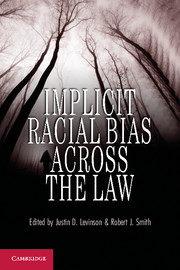Book contents
- Frontmatter
- Contents
- Contributors
- Acknowledgments
- Implicit Racial Bias Across the Law
- Introduction Racial Disparities, Social Science, and the Legal System
- 1 Implicit Racial Bias
- 2 Property Law
- 3 Criminal Law
- 4 Torts
- 5 Employment Law
- 6 Health Law
- 7 Education Law
- 8 Communications Law
- 9 Corporations Law
- 10 Tax Law
- 11 Intellectual Property
- 12 Environmental Law
- 13 Federal Indian Law
- 14 Capital Punishment
- 15 Reparations Law
- Index
- References
7 - Education Law
Unconscious Racism and the Conversation about the Racial Achievement Gap
Published online by Cambridge University Press: 05 June 2012
- Frontmatter
- Contents
- Contributors
- Acknowledgments
- Implicit Racial Bias Across the Law
- Introduction Racial Disparities, Social Science, and the Legal System
- 1 Implicit Racial Bias
- 2 Property Law
- 3 Criminal Law
- 4 Torts
- 5 Employment Law
- 6 Health Law
- 7 Education Law
- 8 Communications Law
- 9 Corporations Law
- 10 Tax Law
- 11 Intellectual Property
- 12 Environmental Law
- 13 Federal Indian Law
- 14 Capital Punishment
- 15 Reparations Law
- Index
- References
Summary
“What's happened to us?” My friend Tom asks this question with the intimate tone of one sibling speaking to another about a family problem.
“I just read that 60 percent of black males in D.C. drop out of high school,” he says. “Can that be true? Have we let things get that bad?” Tom looks up from the sink where he is rinsing dishes before putting them in the dishwasher. He is waiting for my answer.
I am not sure how to begin. I could finesse and tell him that I need to consult the latest data on the dropout rate. Yet Tom’s question poses a greater challenge. He is not really asking a question at all, at least not one that solicits my expertise as an academic who teaches and writes about race and education policy. Instead, he is initiating a conversation. Over the course of our thirty-year friendship, Tom and I have found ourselves in some version of this conversation more times than I can easily count. It is a conversation about what our parents’ generation used to call “the state of the race.”
Tom wants to know my opinion on what the media pundits and policy wonks call “the racial achievement gap” or, less euphemistically, “the black–white achievement gap.” He has seen some of the flood of newspaper and magazine articles that tell a story of a wide and persistent gap between the academic performance of white and black children and ask the rhetorical question, “Why?” Tom is way too smart to think that I or anyone else has a single simple answer to this question. He is really asking me to think out loud with him about how we should respond. I use the word “we” here in the same way Tom has used the word “us” in his first question. We both understand that we are speaking, as our parents would, about what should be the collective response of “the race.”
- Type
- Chapter
- Information
- Implicit Racial Bias across the Law , pp. 113 - 131Publisher: Cambridge University PressPrint publication year: 2012



